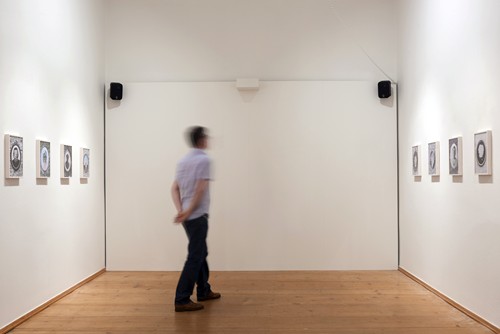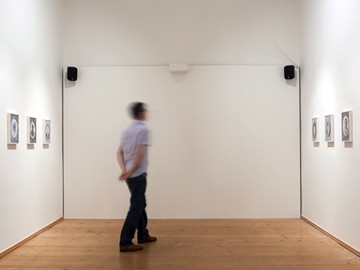UNTITLED
2-Channel-Sound Installation
Commissioned by Südtiroler Künstlerbund and Hofburg Brixen
Curated by Michael Rainer | Thomas Rainer

Non, rien de rien / Non, je ne regrette rien. I regret nothing. In order to repent, one must remember. Of what has been. The guilt you have taken on yourself. The pain you've caused. The love that has been given away. The good you've done. Of life with its ups and downs. All the sounds, images, smells, sensual experiences that have remained. And as condensed compositions from time to time unconsciously break out of the prison of memory or want to be recalled quite consciously. I can not remember!
C’est payé, balayé, oublié / Je me fous du passé. What if I don't even want to remember? Waste of time. Looking ahead. Not to the left and not to the right. Straight. With the head through the wall. Catch me up. The emotions. You cannot be driven away. Claim their right. Are back suddenly. As a taste on the cook's tongue, as a color in the thief's eye or as a sound in his wife's inner ear. Your lover lives in a bookcase. These save all the memories he ever had.
Avec mes souvenirs / Je allumé le feu. Manuela Kerer dares to experiment. How does memory sound like and what does that have to do with emotions? She goes on the trail of acoustic memory and shapes the results of her investigation into a work of art. Your subject is a difficult one. One that one doesn't like to talk about. And that will affect us all. Age. Old age and its fearful taboo. Forgetting. The dementia. What can people remember in old age? Manuela Kerer wants to know and lights a fire.
Balayé pour toujours / Je repars à zéro. Back to the origin. What was in the beginning? What was the first sound you heard? The first flower you smelled? The first person you tasted? A rush of water? The highway? Carl Philipp Emanuel Bach or Edith Piaf? What do you feel? Would you like to tell? Of your life before any memory. Before the loss. From the pain and from the people who surround you every day. Of things to remember.
Ni le bien, qu’on ma fait / Ni le mal / Tout ca me bien don't care. There are no barriers. I want to report what happened. Bear your testimony and move on. Indulge in the emotions and remember. The banal, the everyday, the inconsequential and yet so deeply stored inside. How should I translate it, how should I report about it? Softly, with a hum. Or very loud. Screaming. Singing. Manuela Kerer recorded all of this and translated it into a ten-hour audio document. These recordings are intertwined with the musical images that emerged in her head while listening.
Car ma vie / Car mes joies / Aujourd’hui / Ca commence avec toi. The 2-channel composition unfolds as a musical narrative - almost a bit like a radio play. The voices structure the sound composition. Everything starts with them. They tell of the beauty and the horror of memory. And the digital storage medium keeps them for us. Even if they are no longer. They trigger new emotions and are stored as thought trails in the memory. They begin a new life that at some point wants to tell about all that has been. In the early autumn of 2019. In a beauty case in the Hofburg in Brixen.
Non, rien de rien / Non, je ne regrette rien. Ich bereue nichts. Um zu bereuen, muss man sich erinnern. An das, was gewesen ist. Die Schuld, die man auf sich geladen hat. Den Schmerz, den man verursacht hat. Die Liebe, die man verschenkt hat. Das Gute, das man getan hat. An das Leben mit seinem Auf und seinem Ab. An all die Töne, Bilder, Gerüche, sinnlichen Erfahrungen, die geblieben sind. Und als verdichtete Kompositionen von Zeit zu Zeit unbewusst aus dem Gefängnis des Gedächtnisses ausbrechen oder ganz bewusst abgerufen werden wollen. Ich kann mich nicht erinnern!
C’est payé, balayé, oublié / Je me fous du passé. Was ist, wenn ich mich gar nicht erinnern will? Zeitverschwendung. Den Blick nach vorne gerichtet. Nicht nach links und nicht nach rechts. Geradeaus. Mit dem Kopf durch die Wand. Holen sie mich ein. Die Emotionen. Sie lassen sich nicht vertreiben. Fordern ihr Recht. Sind mit einem Mal wieder da. Als Geschmack auf der Zunge des Kochs, als Farbe im Auge des Diebs oder als Geräusch im Innenohr seiner Frau. Ihr Liebhaber lebt in einem Bücherschrank. Diese speichern all die Erinnerungen, die er jemals hatte.
Avec mes souvenirs / Je allumé le feu. Manuela Kerer wagt ein Experiment. Wie hört sich Erinnerung an und was hat das mit Emotionen zu tun? Sie begibt sich auf die Spur des akustischen Gedächtnisses und formt die Ergebnisse ihrer Untersuchung zu einem Kunstwerk. Ihr Untersuchungsgegenstand ist ein schwieriger. Einer über den man nur ungerne spricht. Und der uns doch alle betreffen wird. Das Alter. Das hohe Alter und sein angstbesetztes Tabu. Das Vergessen. Die Demenz. An was können sich Menschen im hohen Alter erinnern? Manuela Kerer will das wissen und entzündet ein Feuer.
Balayé pour toujours / Je repars à zéro. Zurück zum Ursprung. Was war am Anfang? Welches war das erste Geräusch, das Sie gehört haben? Die erste Blüte, an der Sie gerochen haben? Der erste Mensch, den Sie geschmeckt haben? Ein Wasserrauschen? Die Autobahn? Carl Philipp Emanuel Bach oder Edith Piaf? Was spüren Sie? Möchten Sie erzählen? Von Ihrem Leben vor jeder Erinnerung. Vor dem Verlust. Vor dem Schmerz und vor den Menschen, die Sie täglich umgeben. Von Dingen, an die Sie sich erinnern können.
Ni le bien, qu’on ma fait / Ni le mal / Tout ca me bien egal. Es gibt keine Schranken. Ich will berichten von dem, was war. Zeugnis ablegen und weiterleben. In den Emotionen schwelgen und mich erinnern. An das Banale, das Alltägliche, Belanglose und doch so tief im Inneren Abgespeicherte. Wie soll ich es übersetzen, wie davon berichten? Leise, mit einem Summen. Oder ganz laut. Schreiend. Singend. Manuela Kerer zeichnete all das auf und übersetzte es in ein zehn Stunden langes Tondokument. Diese Aufzeichnungen verschränken sich mit den musikalischen Bildern, die in ihrem Kopf beim Zuhören entstanden.
Car ma vie / Car mes joies / Aujourd’hui / Ca commence avec toi. Die 2-Kanal-Komposition entfaltet sich als musikalische Erzählung - fast ein wenig wie ein Hörspiel. Die Stimmen strukturieren die Klangkomposition. Mit ihnen beginnt alles. Sie erzählen von der Schönheit und dem Grauen der Erinnerung. Und das digitale Speichermedium bewahrt sie für uns auf. Auch wenn sie nicht mehr sind. Sie lösen neue Emotionen aus und werden als Gedankenspur im Gedächtnis abgespeichert. Sie beginnen ein neues Leben, das irgendwann von all dem erzählen will, was gewesen ist. Im Frühherbst des Jahres 2019. In einem Beauty Case in der Hofburg in Brixen.
Text: Michael Rainer
